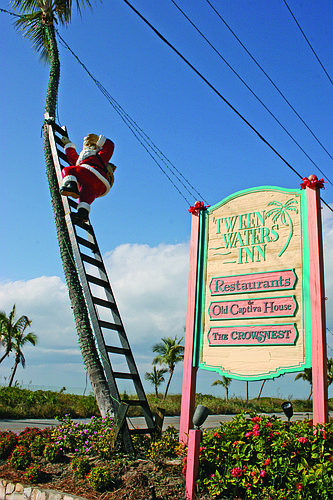REVIEW SUMMARY
Industry. Hospitality
Trend. Hotel owners face another challenging year.
Key. Manage expenses through 2010 to a recovery in 2011.
This year, visitors to Florida were so confident they'd find plentiful and cheap hotel rooms that they showed up without reservations.
That trend could continue into 2010.
Besides making staffing decisions nearly impossible, this trend of last-minute booking forced hoteliers to slash room rates to boost occupancies.
Revenues per available room, an important financial gauge that is a function of occupancy and room rates, have fallen 21% in Fort Myers and Naples for the year
through October compared with the same period in 2008, according to Smith Travel Research. In Tampa and Sarasota, this metric fell 16%.
“I don't think we'll have a strong season or anything like 2006 or 2007,” says Dennis Reed, senior vice president with hotel consulting firm The Plasencia Group in Tampa. “We've seen a little bit of a turnaround, but by no means are we out of the woods.”
Leisure travel continues to be hampered by persistently high unemployment, which puts fear into those who still have jobs. Meanwhile, corporations are still shy about spending for travel unless it's critical. “We've seen some properties down in the 30% occupancies for the year,” Reed says.
Still, if the broader economy doesn't get worse, most agree that the hotel business can stabilize in 2010 and perhaps rebound in 2011. “Flattening demand will help hoteliers from cutting rates further,” says Jan Freitag, vice president with Smith Travel Research.
But if the season doesn't at least match last year, then rates could fall further. “The overall challenge is that everyone is trying to buy market share through rate discounting,” says Sal Dickinson of Dickinson and Associates in Fort Myers. But that strategy could be self-defeating. “Discounting is good if you're able to really gain business instead of giving up revenue.”
Flat is good
“Flat is the new norm,” says Tony Lapi, president and chief executive officer of Rochester Resorts, owner of Tween Waters Inn in Captiva. Lapi will take over next summer as chairman of Visit Florida, the state's tourism arm.
Beachfront properties such as Tween Waters have fared better because they don't rely as much on the hard-hit corporate market. “If you have a job now, you probably feel pretty lucky and fortunate,” Lapi says. “We're hoping that positive attitude catches on.”
Some hotels are seeing signs of improvement for the spring tourism season. David Teitelbaum of Ana Maria Resorts near Sarasota says reservations for the seasons are above 2009 levels by about 10% over the same time a year ago. “I'm very pleased with what I'm seeing,” Teitelbaum says.
In particular, Teitelbaum says weddings are up. “Weddings bring 60 to 100 people at a shot and they come back,” he says.
One positive factor is the rebound of the stock market, which contrasted with the last months of 2008 marked by the near-collapse of the financial markets. “People don't feel quite as bad,” Freitag says.
But the relatively high unemployment rate has prompted leisure travelers to seek out deals and spend less than they used to. “People who may have spent longer on vacation may not go for the same level of accommodation,” says Dickinson. Instead of a suite, they may opt for a smaller room this year, for example.
Corporations start to spend
Corporate travel has yet to rebound, but some hoteliers have seen a rise in bookings recently. “If you had asked me that question two months ago, I would have had a different answer for you,” says Jim Bartholomay, general manager of the Renaissance Tampa International Plaza Hotel. “That segment is waking up again.”
Companies may have cut travel to excess.
“We think that the travel managers who have cut corporate travel in late 2008 are realizing you can't sustain a business without traveling,” says Freitag. What's more, hotels are offering more favorable rates, making it easier to justify the expense.
In Tampa, it will be difficult to match last year because of the impact of the Super Bowl. “We're a little concerned for a soft first quarter,” says Norwood Smith, vice president of sales for Tampa Bay & Company, the area's tourism arm.
Next summer looks more favorable, however. The biggest group now on the books for Tampa is the August gathering of the Ancient Egyptian Arabic Order Nobles of the Mystic Shrine, which is expected to fill 18,320 room nights with 15,000 attendees.
But the slow return of corporate business may not arrive in time to save many limited-service hotels that have sprung up along Interstate 75 in recent years.
“The interstate properties have been hit the worst,” says Reed. “We're going to see more foreclosures on the limited-service side.”
Hold on until 2011
Luxury hotels have more room to cut expenses than limited-service hotels that already have lean operations.
“The luxury and full-service hotels can cut back on services and juggle their staff,” Reed says. “It's hard for those limited-service properties to do much in the way of cost cutting.”
One small consolation: If demand stabilizes, rates shouldn't fall much further. “The only way we'd see a drop is an outright depression with 18% or 20% unemployment,” Reed says. “I think those hoteliers who can hold out and make ends meet and survive 2010 will be in a much stronger position.”
Another positive sign is that new construction has come to a halt. “There's not a lot of new supply because there's no financing available,” says Freitag. The commercial mortgage-backed securities market that helped fuel new construction during the recent boom has disappeared.
The situation today is somewhat analogous to the downturn in travel that followed the terrorist attacks of 2001. It wasn't until 2003 that the hospitality industry started recovering.
Just like after the attacks of 9/11, leisure travelers and corporations made travel plans at the last minute.
“We meet daily and talk about our strategies and how we sell the hotel,” says Bartholomay. “It's our way of combating the change in booking cycles.”
Freitag advises hotels to understand the shortened booking cycle and to not discount too early. “Hold on and stick with the plan you made,” he counsels. “Trust that your customers will show up.”
BY THE NUMBERS
Hotel revenues drop
Revenue per available room (RevPar) is a function of hotel occupancy and rates and is an important gauge of the health of the hotel business. Every area of the Gulf Coast saw double-digit percentage declines in revenues through the first 10 months of 2009, according to Smith Travel Research.
Area RevPar through October %change
Tampa-St. Petersburg $54.05 -15.9%
Sarasota-Bradenton $60.64 -16.2%
Naples $93.50 -20.6%
Fort Myers $62.18 -20.8%
Jean Gruss covers the Lee-Collier region. He can be reached at [email protected], or at 239-415-4422






